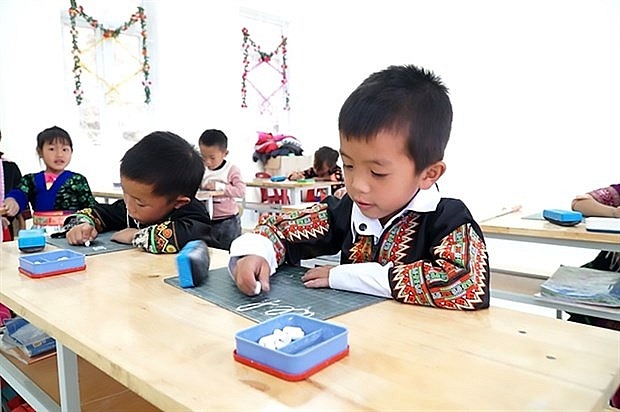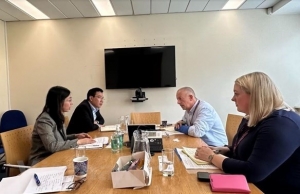Ethnic schools seek alternatives as new programme offers limited language course options
 |
| A Mong ethnic student in Nghe An province learns how to write in his mother tongue. (Photo: giaoducthoidai.vn) |
Nghe An - While the new general education programme has ethnic languages as elective courses, the limited options on offer mean that schools are struggling to decide on alternatives for students whose mother tongue is not included.
The Nhon Mai Semi-boarding School for Ethnic Minorities is located in one of the most remote communes in Tuong Duong district, central Nghe An province.
Most of the school students are of Mong ethnicity, followed by Kho Mu and Thai.
In accordance with the optional subjects in the new general education programme, Mong and Thai students can sign up to learn their ethnic languages.
However, the case is not the same for Kho Mu students, even though they outnumbered the group of Thai students at the school.
As the optional subject of Ethnic Language only offers Bahnar, Cham, Ede, Khmer, Jrai, Mnong, Mong and Thai languages, Kho Mu students have no textbook or teacher to learn theirs.
Tran Duc Quy, the school’s deputy dean said: “They are still very young, so they are not fully aware of the importance of language and writing in their ethnic cultural identity.
“Therefore, the enrolment for ethnic language courses depends on the attentiveness and encouragement from the teachers.
“However, from the viewpoint of parents and people, if we only have Thai and Mong language classes and none for Kho Mu, there will be comparisons and concerns.”
Vo Tuyet Chinh, deputy head of Tuong Duong district’s education and training pision, said that the locality is the largest mountainous area in Nghe An province, and is home to multiple ethnicities.
“Teaching ethnic languages is a way to preserve and promote the ethnic identity for students. This is also a mission of education in the mountainous areas," said Chinh as quoted by the Giao duc & Thoi dai (Education & Times) e-newspaper.
“However, the implementation process faces multiple challenges, including teaching materials and personnel.
“We hope a detailed guideline will soon be issued before we get to work.”
Meanwhile, the Thong Thu 1 Primary School in Que Phong district is still weighing the optimal solution regarding language teaching.
Tang Xuan Son, the school’s dean said that the majority of the students here are of Thai ethnicity, and they all use their mother tongue in their community.
However, the primary school does not yet teach them how to read and write Thai, as the local dialect has certain differences compared to the teaching materials available.
Therefore, the school is considering using the two weekly elective periods for English or supplemental Vietnamese classes.
This would help them with communication and a better understanding of the textbooks in the new education programme.
In Ky Son district, the Dooc May Primary School has been holding Mong language classes for several years.
All of its pupils are of Mong ethnicity, and therefore are excited to learn to read and write in their mother tongue, said the school’s dean Tran Huu Truong.
With his years of experience in the local education sector, Truong agreed that teaching ethnic languages is very difficult in schools whose students are of various ethnicities, instead of just one like Dooc Mạy commune.
He also shares the perspective that in these schools, students can utilise the two elective periods for English, if there are enough teachers, or for additional Vietnamese lessons.
Truong explained that ethnic primary schoolchildren tend to have difficulty in understanding the national language, and therefore take more time to learn compared to those who have the official language as their mother tongue.
These could also be beneficial for younger students when they go to the third grade and foreign language is a compulsory subject.
Thai Binh Duong, who is in charge of ethnic minority affairs at the Nghe An Provincial Department of Education and Training, said that based on the registrations submitted by local schools, the department will help organise ethnic language classes when there is sufficient teaching materials and teachers in charge.
They are also working on an alternative option for students whose ethnic language is not among those included in elective courses in the new general education programme to ensure the children’s benefits.
 | HCM City tasked to become int’l education, training centre The Government has assigned the Ministry of Education and Training to closely coordinate with the Ho Chi Minh City People's Committee to develop a project to turn the city into an international centre for education and training to attract students from the Southeast Asia region and the world. |
 | Vietnam, Ireland boost education, sci-tech cooperation The Vietnamese Embassy in the UK had a working session with the Irish Department of Further and Higher Education, Research, Innovation and Science (DFHERIS) in Dublin on July 10 in a bid to step up the two countries' cooperation in education, science, and technology. |
What the stars mean:
★ Poor ★ ★ Promising ★★★ Good ★★★★ Very good ★★★★★ Exceptional
Related Contents
Latest News
More News
- Tet event in Japan celebrates success of 14th National Party Congress (January 25, 2026 | 10:04)
- 14th National Party Congress wraps up with success (January 25, 2026 | 09:49)
- Congratulations from VFF Central Committee's int’l partners to 14th National Party Congress (January 25, 2026 | 09:46)
- List of newly-elected members of 14th Political Bureau announced (January 23, 2026 | 16:27)
- 14th Party Central Committee unanimously elects To Lam as General Secretary (January 23, 2026 | 16:22)
- List of members of 14th Party Central Committee announced (January 23, 2026 | 09:12)
- Highlights of fourth working day of 14th National Party Congress (January 23, 2026 | 09:06)
- Press provides timely, accurate coverage of 14th National Party Congress (January 22, 2026 | 09:49)
- Press release on second working day of 14th National Party Congress (January 22, 2026 | 09:19)
- Minister sets out key directions to promote intrinsic strength of Vietnamese culture (January 22, 2026 | 09:16)

 Tag:
Tag:




















 Mobile Version
Mobile Version